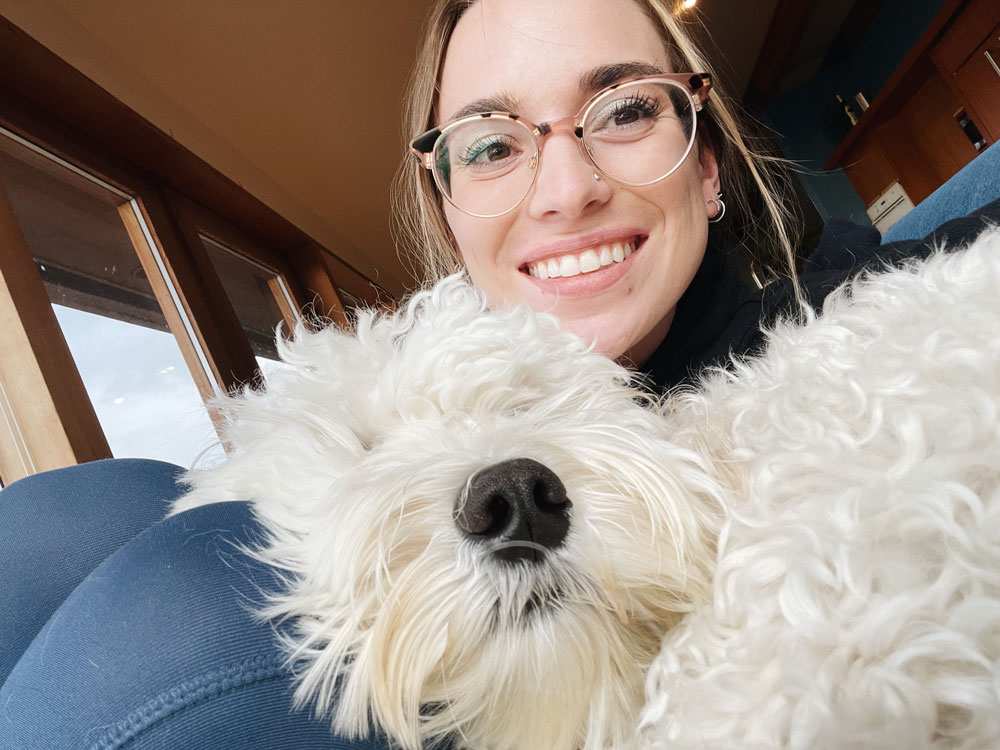UW Psychology Graduate Student Receives National Science Foundation Graduate Research Fellowship
McKenzie Hagen (mentored by Ariel Rokem), received a National Science Foundation Graduate Research Fellowship to support their research on reproducibility and variability in empirical MRI results. McKenzie Hagen also received a Department of Energy Computational Sciences Graduate Fellowship. Learn more about McKenzie below!
Let's start with the basics. Where are you from and where did you complete undergrad/masters?
I grew up a couple of hours north of Seattle and completed my undergraduate at UW. I spent a couple of years doing post-baccalaureate research and catching up on a lifetime of vitamin D exposure at Stanford before coming back to UW.
How did you wind up at UW/why did you apply here?
I applied to UW because I was interested in incorporating methodological work into my research, and my advisor’s research fit that bill. Because of my time here in undergrad, I knew that I would be supported personally and professionally by the faculty in my area, and the prospect of being involved with the new Center for Human Neuroscience definitely didn’t hurt.
What is your research interest and how did you get into it? What inspires/motivates you?
It’s simple - I really just love learning about how brains work. I’m really attracted to the idea that we can use giant magnets to “see” different qualities of brains, and use that information to tie psychological processes to something tangible about the brain. I spent my years at Stanford learning about how to do robust neuroimaging research, and now I hope to start to address limitations through computational modeling.
How did you learn about your funding opportunity? Tell us about the application/waiting process.
I received two fellowships this year, the National Science Foundation Graduate Research Fellowship and the Department of Energy Computational Science Graduate Fellowship. I had heard about the NSF GRFP from a former mentor, and I learned about the DOE CSGF from a spreadsheet online that compiled many different funding opportunities. Both required me to write about my previous research experience and propose a project. The DOE CSGF specifically wanted to know about my previous work using computational resources, and how my work and field would benefit from access to additional computational resources. Once they were submitted in October and January, I just had to be patient and wait until April, which was maybe the hardest part!
How did you feel when you learned that your application was accepted and that you will receive funding?
I was honestly really surprised! I had received positive reviews and an honorable mention on a previous submission of the GRFP, so I was cautiously optimistic about that one, but it was still so validating to be awarded the fellowship and receive really positive comments on my research proposal. For the CSGF, I couldn’t believe it when I learned that I had been awarded. I actually still can’t! I’m also just immensely grateful for everyone who has supported me, and provided me with the opportunities to succeed.
What is the name of your project and the funding source?
I could only accept one, so I declined the NSF GRFP in favor of the DOE CSGF. I proposed a systematic study of the different analytic decisions that researchers who use MRI make, and the role of those decisions on the reproducibility and variability in empirical MRI results.
Do you have any advice/tips/suggestions for others who may apply to this opportunity? About graduate study in general?
My biggest advice would be to just apply. There’s a bit of an opportunity cost, but I found that the process of writing my proposals was really useful for thinking about what research topics I want to study, and how to study them. Aside from that opportunity cost, there’s really no downside to applying for funding, with a obvious payoff. As for graduate school in general, I’m still getting the hang of it, but it’s been really important to form supportive relationships with my peers!
What do you like doing in your spare time?
Reading novels, cooking, and hanging out with my dog, Newton.
What do you plan to do once you complete your PhD?
Get another dog!
Our Department's graduate programs continue to be a top destination for prospective students. Gifts to our graduate fellowships and student support funds allow us to attract and retain a more diverse, well-rounded cohort of students. Support the training, research, and professional development of underrepresented graduate students in the Department with a gift to the Psychology Diversity Fund.
